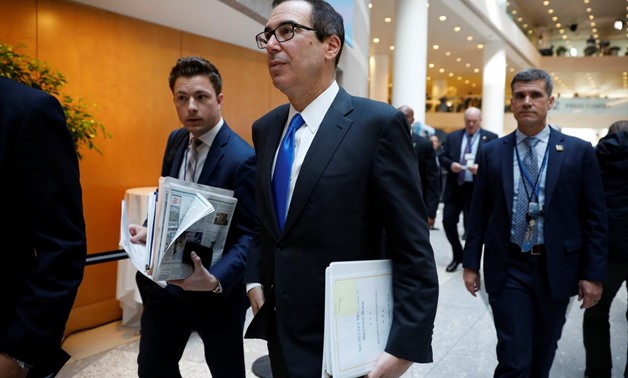
U.S. Treasury Secretary Steve Mnuchin speaks at a news conference during the IMF/World Bank spring meeting in Washington, U.S., April 21, 2018. REUTERS/Yuri Gripas
WASHINGTON - 22 April 2018: U.S. Treasury Secretary Steven Mnuchin said on Saturday he may travel to China, a move that could ease tensions between the world's two largest economies, as international policymakers acknowledged Beijing needs to change its trade practices.
The United States has threatened to impose tariffs on up to $150 billion of Chinese imports to try to force changes in Beijing's industrial policies, which Washington says are aimed at acquiring American intellectual property.
Mnuchin told reporters he was continuing to have discussions with his Chinese counterparts to try to resolve the differences over trade, but said he may go to Beijing.
"A trip is under consideration," Mnuchin said at a press conference during the International Monetary Fund and World Bank spring meetings in Washington.
"I am not going to make any comment on timing, nor do I have anything confirmed, but a trip is under consideration."
Mnuchin also declined to say what he wants from a trade deal with China, adding, "If we have a deal, you'll know what it looks like when we have it."
China has threatened retaliation against U.S. exports if Washington pushes ahead with the tariffs. The row cast a pall over the semi-annual gathering of the world's finance officials, with IMF Managing Christine Lagarde warning earlier this week that it could damage confidence, investment and growth in the global economy.
Lagarde told a press conference on Saturday that there would be no winners from such a conflict.
"It is important that as a global community we keep trade open, we ensure that we work within the multilateral system that we have to make sure if there are disputes, these disputes are resolved," she said.
Mnuchin said he met with China's new central bank governor, Yi Gang, during the IMF and World Bank meetings and discussed the potential for China to open its markets to more foreign competition.
"I did meet with the Chinese here. The discussions were really more around the governor's actions at the PBOC (People's Bank of China) and certain actions they've announced in terms of opening some of their markets, which we very much encourage and appreciate."
Beijing announced on Wednesday that it would gradually eliminate ownership caps on foreign manufacturers of autos, aircraft and ships.
ADJUSTING TO TRUMP
A year after U.S. President Donald Trump first rankled multilateral finance meetings with his "America First" trade agenda, some officials are starting to acknowledge he has changed the conversation on trade, even if they disagree with his tariff plans.
"No one can be in any doubt that the U.S. has a valid point about intellectual property theft" by China, British finance minister Philip Hammond said on Friday. "It's been going on, on an industrial scale, over many years and we've been targets of it just as the U.S. has."
At the same time, Hammond said using tariffs was the wrong way to settle trade disputes, and he was urging China to do more to open its markets to foreign competitors, particularly in services.
A senior Japanese government official drew a clear distinction between Japan's trade issues with the United States and the U.S.-China dispute.
"It's a separate issue," the official said on condition of anonymity. "If Trump can help change China’s behavior, there is room for Japan to benefit."
A European official at the meetings said policymakers were trying to reduce trade pressures during the talks, but added that they wanted to "make sure there is a level playing field on trade, that China is in the same framework that others share."
Regarding trade with Japan, Mnuchin said the Trump administration wants a bilateral trade agreement and has had discussions with Tokyo about such talks.
Japan wants the United States to rejoin the multilateral Trans-Pacific Partnership trade pact, as it fears opening talks for a bilateral free trade agreement could put it under pressure to open up politically sensitive markets like agriculture.


Comments
Leave a Comment